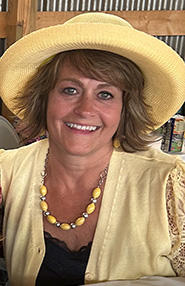Featured Educator discusses multilingual learning in a rural district

Susie LaCroix got her start in education as a kindergarten teacher, where she had the opportunity to work with multilingual children. For nearly 30 years, she’s been teaching in Weston County School District #1, a rural district in Wyoming. Through the years, Susie has taught students of all ages. Since 2010 she’s been the English as a second language coordinator and teacher, as well as the preschool liaison in the district.
Note: The following interview has been lightly edited for clarity and length.
Can you tell us about your career in education?
Susie: After graduating from Black Hills State College in Spearfish, South Dakota I had the opportunity to venture to the southwest and landed a kindergarten teaching position in Palm Springs, California. I’ll always cherish my first year of teaching. I taught 32 children and 17 of them spoke Spanish. I didn’t have any experience in multilingualism at that time. My kindergarten children and I learned from each other. We learned to communicate together while appreciating each other’s cultures and understandings of languages.
My family and I later moved to Newcastle, Wyoming where I was given the opportunity to teach in a rural community just on the edge of the Black Hills of South Dakota. We’ve now been in this community for over 30 years.
What inspired you to advocate for multilingual learners in your school?
Susie: I sort of fell into the work because of my experience working with multilingual learners and was prepared to take the challenge. After developing relationships with families and watching the growth and excitement of students learning the English language, I was hooked! My inspiration really came from their smiles and appreciation. The success stories have continued my admiration for multilingual learners. I’m now teaching with one of my first students that I had back when I taught kindergarten. She's our translator and parent contact for our school district.
What are some of the unique challenges you face when supporting multilingual learners in a rural setting?
Susie: It can be challenging to help staff understand the needs of our multilingual learners. Because our multilingual learners are less than 20% of our school population, the state does not provide financial support for extra programs or tools for our learners. But we still need to provide these materials. Another challenge is ensuring all our staff understands the WIDA English Language Development Standards Framework.
What do language services look like in your school/district? How do you use those services/resources?
Susie: I’m the EL coordinator/teacher and the preschool liaison all in one. This means I’m needed in all four levels of school, from Pre-K through high school. It can be challenging to be in all places at once and provide extra support in the classroom for those students.
The WIDA ELD Standards Framework, WIDA Screener and ACCESS for ELLs are used to determine levels and goals for individual students.
We’ve been fortunate to have a program called Walk to Learn in our elementary school that provides extra intensive support for literacy and math. Communication is extremely important, but sometimes there doesn’t seem to be enough time in the day!
How do you engage and involve families in their children’s education?
Susie: We try to translate all communications we send home. We use ClassDojo which allows us to communicate daily with classroom information and pictures of projects.
As I mentioned earlier, a former student is now our district translator and is extremely valuable when it comes to family engagement. We have school carnivals, Adventures in Learning Night and open houses that we invite our families to be involved in. We’ve had relationships with families grow and evolve over time, which has been very rewarding.
Is there a professional development offering you’ve found particularly helpful when it comes to your work and multilingual learners?
Susie: The WIDA professional development opportunities have been extremely helpful. The trick is finding the time to get it all in. I do wish we could go back to more face-to-face interactive professional development. I think we learn so much more from conversations with each other.
How do you foster collaboration among educators, administrators and the community to support multilingual learners?
Susie: This is a challenge and I continue to work on this. We are given the opportunity to collaborate during our professional learning community meetings once a week. I strive to try to make these once a month at each grade level. The administration, middle school and high school levels are more difficult and usually is more of a consultation through emails and less frequent face-to-face meetings.
What advice would you give to other educators in rural settings who want to better support their multilingual students?
Susie: Relationship building is the key to success. If your families and students trust that you are striving to help them succeed, the support and attitude toward learning will be extremely positive. Open collaboration and communication with all educators and support staff can be difficult, but keep on climbing to get our students to the top!
Anything else you’d like to add?
Susie: As a summer learning adventure, I get to drive the bookmobile in our community and rural areas. We have Pre-K activities and lessons to give them a jumpstart to kindergarten. Middle school multilingual learners ride with me in the afternoon and practice their translation skills working with level 1-3 English-speaking students by helping them gain language skills to prepare for the upcoming school year.
It’s a true gift to see the joy and smiles a student portrays when they see their own improvement in language, academics or just relationships built with friends. I love the saying, “Shoot for the moon, if you miss you will land among the stars” I have been given the ultimate gift to be able to work and be part of these true stars!





